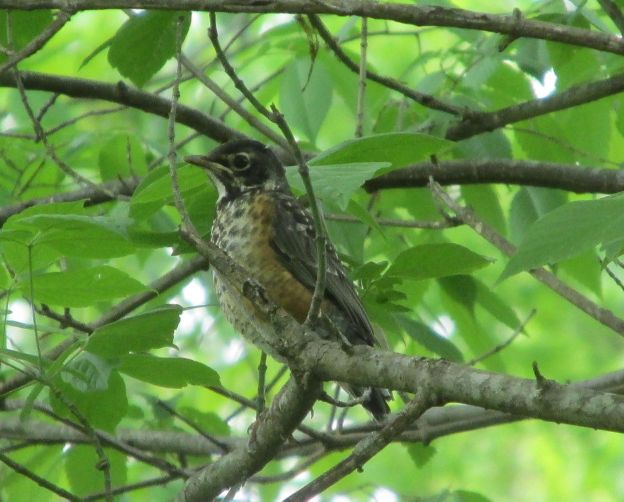
Photo by Bryan Stevens An American robin forages for food to take back to hungry young.
I’ve gotten a couple of questions recently on a puzzling problem regarding American robins and windows. To be more specific, the robins are throwing themselves against windowpanes in the mistaken assumption they are safeguarding territory from intruders.
Sheila Myers, a resident of Seven Mile Ford, Virginia, wrote to me a few weeks ago about her problem with a robin. “The bird started bumping my window April 14,” Sheila explained in an email. “I covered the window with plastic bags and newspaper strips, but the bird would still fly around the obstacles.” When she removed the obstacles, the bird came back again.
Sheila also shared an interesting encounter with one of our larger birds.
“As I was driving home some time ago, I was coming up a hill and almost collided with an eagle,” she wrote. “The eagle had a possum in its talons.”
As much as it was a surprise for Sheila, the encounter was also a shock for the eagle. “The eagle dropped its prey and was able to soar just above my van,” Sheila wrote. “It was quite a beautiful experience.”
In addition to Sheila’s email seeking a solution to her robin problem, I also received a message from Phil Rust, who is also having a similar problem with a male robin. “Hopefully you can help us with a major problem at our home,” Phil wrote. “Since early spring robins have been attacking several of our windows about 8 to 9 a.m. daily.”
Phil explained that the robins fly into the glass from top to bottom leaving a mess all over. “The sills are covered with droppings and they peck the glass violently,” he added. “Removing all their mess has not deterred them. Rubber snakes in the sills hasn’t phased them either. Any suggestions please?”
The problem is rooted in bird biology and isn’t readily solved by anything people can do to deter the robins. The offenders are probably male robins with surging spring hormones. The robins are seeing their reflections and think it is another male robin. Birds under the influence of their hormones get very single-minded. Given some time, he will probably lose interest in your windows.

Photo by Bryan Stevens Northern Cardinals can also be tricked into attacking their reflections in a window pane during the nesting season when elevated hormones affect the bird’s behavior.
This problem isn’t confined to American robins. I’ve experienced a similar situation myself with a female Northern cardinal. In her case, her nest was near a window at the back of the house. When she would catch sight of her reflection, she assumed another female had encroached into her nesting territory.
I’ve also seen Eastern bluebirds and dark-eyed juncos attack the exterior mirrors on parked vehicles. The junco was attacking the mirrors of several cars parked in a lot at Roan Mountain State Park in Tennessee. No sooner would the bird tire of attacking one mirror than it would catch sight of its reflection in another mirror. The small bird seemed quite tireless in its determination to rid the vicinity of all rival juncos.
The case with the bluebird involved cars in a workplace parking lot. The mirrors were getting quite messy, but the cause remained a mystery until a co-worker caught a male bluebird in the act of vandalizing the mirrors on one of the parked cars. The male bluebird and his mate were actually raising young in a nearby nest box.
In these cases, the birds are responding exactly as their brains are wired to respond. They don’t have the means to differentiate their own reflections from actual rival birds. So, their behavior is likely to continue until their hormones begin to wane near the conclusion of the nesting season.
Most of the robins that returned earlier this spring have already had time to complete one nesting. I’ve even seen some hard-working parent birds delivering food to baby robins waiting impatiently on a perch for these frequent deliveries. Robins will often nest a second and even a third time in a season.

Photo by Bryan Stevens Once the nesting season concludes, most reflection-attacking birds will return to their senses.
Despite occasional lapses into attacking windows and vehicle mirrors, robins are beloved by most people. We’ve even made the American robin the official state bird in Wisconsin, Michigan and Connecticut.
••••••
To learn more about birds and other topics from the natural world, friend Stevens on Facebook at https://www.facebook.com/ahoodedwarbler. He is always posting about local birds, wildlife, flowers, insects and much more. If you have a question, wish to make a comment or share a sighting, email ahoodedwarbler@aol.com.




